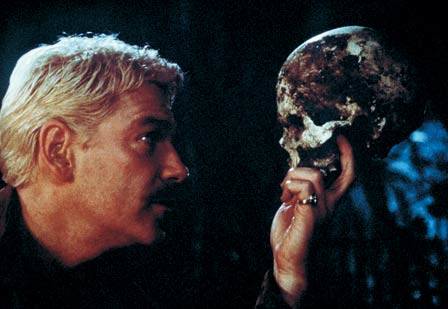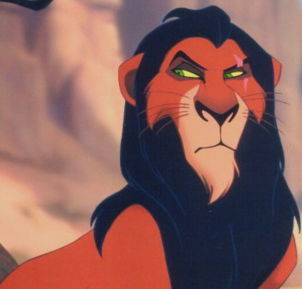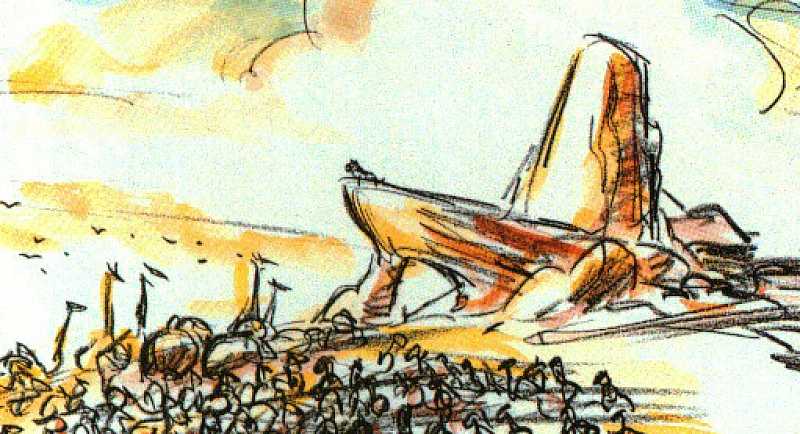 Okay, I must be honest. I have definitely been looking forward to this post for a while. For two reasons:
Okay, I must be honest. I have definitely been looking forward to this post for a while. For two reasons:1) Hamlet is probably my favorite, if not one of my favorite, Shakespeare plays. and
2) I have been DYING to make the comparison between two things that I love: Shakespeare's Hamlet & Disney's The Lion King.
Did you know that the Lion King was based off of Hamlet? Pretty awesome, right? When TLK was released in 1994, critics claimed that it had such a great moral base that it was "comparable to Hamlet in the importance of its themes". Alright, so, I think this is an excellent way to incorporate my major and interests into the discussion of Shakespeare. I wanted to compare the character of Hamlet and perhaps what Shakespeare intended him to represent, and then what Walt Disney and the filmmakers there decided to do with the character of Simba. And maybe even compare Scar with Claudius, if there is time. When looking at these characters, it's incredible to see how closely these filmmakers stuck to what the characters represented while still holding to their unique take on the classic story.
So, Simba v. Hamlet:

Well, certain things are obvious. Both are princes, who lose their father to murder. The playful young Simba is a profound representation of Hamlet. Both, in the face of what has taken place, run from the responsibility that now stands before them. Hamlet, who suspects his uncle and is then spending his time attempting to validate his suspicions. Simba runs away into the wilderness to hide from his past. The loss of a paternal companion leaves Hamlet in a desperately sad state, and Simba is left to grow up without any real guidance during the most important years of his life. Another fascinating thing to think about is that while they are hiding from their inevitable responsibilities to their kingdoms, there is a similarity in their delay for action. Hamlet, many people argue, avoids seeking revenge due to his mental instability and craziness, essentially, although some would argue (and I may agree more with this) that it is simply a ruse to lull his audience. Simba laments his troubles and uses them as an excuse to avoid returning to Pride Rock and claiming what is rightfully his, particularly when his childhood friend and eventual love Nala stumbles upon him.
In the end, though, both step forward to take charge and fulfill the responsibilities which their fathers have prompted them with. They "remember who they are", to quote Mufasa. (Mufasa and Hamlet, Sr. can also be compared as they are both the ghosts of the kings returning to remind their sons of their duties to themselves and their people). Hamlet seeks out Claudius and enacts revenge on him, in the end stabbing him with a poisoned sword and causing his death. He avenges his father as Hamlet Sr. requested. And Simba returns to the Pride lands, and takes his kingdom back from his uncle Scar. He assumes his rightful place at the throne, as his father told him to do.
One has to argue, however, that their motives are perhaps a bit different. Hamlet seeks revenge upon his uncle and takes his life in the end, whereas Simba merely desires to restore his kingdom and put the past behind him. He, in the end, is not the cause of Scar's death, but rather Scar's own followers turn against him.

 It definitely brings on a whole new light to the classic Disney film we all know and love when we think about it this way!
It definitely brings on a whole new light to the classic Disney film we all know and love when we think about it this way!Now, for the villains! Scar v. Claudius:
 Once again, there is much that is comparable with these two characters. Both are brothers of the king, murder their brothers to usurp the throne, and have a deceiving relationship with the main protagonist. Claudius enjoys the benefits of his evil deeds, relaxing in the castle, marrying his brother's wife, throwing banquets in his own honor, and plotting war with the neighboring country. Scar behaves similarly, allowing his hyenas to invade the pride lands, forcing the lionesses to hunt for him while he lounges about in a cave torturing Zazu and gorging himself on what little food remains. Both characters abuse their new-found power to their own pleasure.
Once again, there is much that is comparable with these two characters. Both are brothers of the king, murder their brothers to usurp the throne, and have a deceiving relationship with the main protagonist. Claudius enjoys the benefits of his evil deeds, relaxing in the castle, marrying his brother's wife, throwing banquets in his own honor, and plotting war with the neighboring country. Scar behaves similarly, allowing his hyenas to invade the pride lands, forcing the lionesses to hunt for him while he lounges about in a cave torturing Zazu and gorging himself on what little food remains. Both characters abuse their new-found power to their own pleasure.We have to note, though, the difference in motives as the story continues. Both Claudius and Scar in the end reveal what they have done, but for entirely different reasons. Claudius appears to feel remorse for what he has done, and he confesses out of fear for his soul. Scar, on the other hand, feels no guilt and even uses his confession as a way to enrage or taunt Simba. He whispers that he killed Mufasa as Simba dangles in the same position that Mufasa had just before he died. There is a striking contrast in that way between the two villains.
The small differences in motive between the main protagonists and antagonists in both stories makes me think about the purpose that both authors/filmmakers had. In the Disney film, Scar and Simba needed to be two very differently motivated characters: black and white, good and evil. As a children's story, perhaps they intended to make Scar purely evil and Simba purely good as a way of breaking it down for kids. In Shakespeare's Hamlet, the characters are much more complex than that. Claudius obviously did horrible things and has his share of skeletons in his closet - but he seeks to make things right, even if he cannot. And Hamlet, he only acts out of revenge and takes the life of Claudius, even as Claudius took the life of Hamlet's father.
You can even think about minor characters in both stories and find similarities. Rosencrantz and Guildenstern are comparable to Timon and Pumbaa. Both pairs serve as companions to the protagonists and act as relief from the main story. Nala and Ophelia, who are the lovers of the protagonists. As well as Sarabi and Gertrude, the queens and mothers of Hamlet and Simba.
This really brings home the idea that there is no new literature, just old literature being redone. How true. And how amazing that Shakespeare's works can have such a lasting impact, even when they are being retold in many unique ways.




I also agree with the whole this play is fantastic. It's my favorite also. And I really like the whole comparison to The Lion King. It changes my view for sure, of that movie. But I still love it either way. I appreciate the insight in showing us how Shakespeare is still alive today in places where we wouldn't really expect it.
ReplyDelete